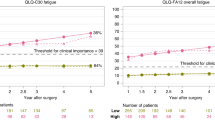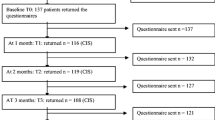Abstract
Purpose
A prospective cohort study was conducted to analyze whether self-reported fatigue predicts overall survival in patients with esophageal cancer.
Methods
Patients enrolled in the Mayo Clinic Esophageal Adenocarcinoma and Barrett's Esophagus Registry between September 2001 and January 2009 who completed a baseline quality of life instrument were eligible for evaluation. The fatigue component was scored on a 0–10 scale, with 0 as extreme fatigue. Patients were categorized as having a decreased energy level if they reported a score of ≤5. Fatigue scores ≥6 reflect normal levels of energy.
Results
Data from a total of 659 enrolled patients were analyzed. A total of 392 (59 %) and 267 (41 %) patients reported decreased and normal energy, respectively. Univariate analysis indicates patients with normal energy had improved 5-year survival compared to patients with decreased energy (37 vs 28 %, hazard ratio (HR) 0.74, p = 0.006). Among the patients with locally advanced disease, the same relationship was seen (28 vs 17 %, HR = 0.67, p = 0.003); this remained significant on multivariate analysis (HR = 0.71, p = 0.015).
Conclusions
A decreased energy level is associated with poor survival in patients with esophageal cancer. Thus, patients with high levels of fatigue should be referred for psychological support and be considered for therapy aimed at amelioration of fatigue symptoms.



Similar content being viewed by others
Abbreviations
- AJCC:
-
American Joint Committee on Cancer
- ANC:
-
Absolute neutrophil count
- cdQOL:
-
Clinically deficient quality of life
- CI:
-
Confidence interval
- DE:
-
Decreased energy
- EABE:
-
Esophageal Adenocarcinoma and Barrett's Esophagus Registry Consortium
- EC:
-
Esophageal cancer
- EORTC:
-
European Organization for Research and Treatment of Cancer
- HR:
-
Hazard ratio
- hrQOL:
-
Health-related quality of life
- LASA:
-
Linear Analog Self-Assessment
- NE:
-
Normal energy
- OS:
-
Overall survival
- QLC-C30:
-
Quality of Life Questionnaire-Core 30
- QOL:
-
Quality of life
- TNM:
-
Tumor node metastasis
References
Jemal A, Siegel R, Xu JQ, Ward E (2010) Cancer statistics, 2010. CA Cancer J Clin 60:277–300
Blazeby JM, Williams MH, Brookes ST, Alderson D, Farndon JR (1995) Quality-of-life measurement in patients with esophageal cancer. Gut 37:505–508
Van Meerten E, Van Der Gaast A, Looman CWN, Tilanus HWG, Muller K, Essink-Bot ML (2008) Quality of life during neoadjuvant treatment and after surgery for resectable esophageal carcinoma. Int J Radiat Oncol Biol Phys 71:160–166
Watt E, Whyte F (2003) The experience of dysphagia and its effect on the quality of life of patients with oesophageal cancer. Eur J Cancer Care 12:183–193
Gaast AV, van Hagen P, Hulshof M, Richel D, van Berge Henegouwen MI, Nieuwenhuijzen GA, Plukker JT, Bonenkamp JJ, Steyerberg EW, Tilanus HW, CROSS Study Group (2010) Effect of preoperative concurrent chemoradiotherapy on survival of patients with resectable esophageal or esophagogastric junction cancer: results from a multicenter randomized phase III study. ASCO Meeting Abstracts 28: 4004
Stahl M, Walz MK, Stuschke M, Lehmann N, Meyer HJ, Riera-Knorrenschild J, Langer P, Engenhart-Cabillic R, Bitzer M, Konigsrainer A, Budach W, Wilke H (2009) Phase III comparison of preoperative chemotherapy compared with chemoradiotherapy in patients with locally advanced adenocarcinoma of the esophagogastric junction. J Clin Oncol 27:851–856
Tepper J, Krasna MJ, Niedzwiecki D, Hollis D, Reed CE, Goldberg R, Kiel K, Willett C, Sugarbaker D, Mayer R (2008) Phase III trial of trimodality therapy with cisplatin, fluorouracil, radiotherapy, and surgery compared with surgery alone for esophageal cancer: CALGB 9781. J Clin Oncol 26:1086–1092
Walsh TN, Noonan N, Hollywood D, Kelly A, Keeling N, Hennessy TPJ (1996) A comparison of multimodal therapy and surgery for esophageal adenocarcinoma. N Engl J Med 335:462–467
Bergquist H, Johnsson A, Hammerlid E, Wenger U, Lundell L, Ruth M (2008) Factors predicting survival in patients with advanced oesophageal cancer: a prospective multicentre evaluation. Aliment Pharmacol Ther 27:385–395
Blazeby JM, Brookes ST, Alderson D (2001) The prognostic value of quality of life scores during treatment for oesophageal cancer. Gut 49:227–230
Coates A, Porzsolt F, Osoba D (1997) Quality of life in oncology practice: prognostic value of EORTC QLQ-C30 scores in patients with advanced malignancy. Eur J Cancer 33:1025–1030
Djarv T, Metcalfe C, Avery KNL, Lagergren P, Blazeby JM (2010) Prognostic value of changes in health-related quality of life scores during curative treatment for esophagogastric cancer. J Clin Oncol 28:1666–1670
Fang FM, Tsai WL, Chiu HC, Kuo WR, Hsiung CY (2004) Quality of life as a survival predictor for esophageal squamous cell carcinoma treated with radiotherapy. Int J Radiat Oncol Biol Phys 58:1394–1404
Frost MH, Sloan JA (2002) Quality of life measurements: a soft outcome—or is it? Am J Manag Care 8:S574–S579
Healy LA, Ryan AM, Moore J, Rowley S, Ravi N, Byrne PJ, Reynolds JV (2008) Health-related quality of life assessment at presentation may predict complications and early relapse in patients with localized cancer of the esophagus. Dis Esophagus 21:522–528
Maisey NR, Norman A, Watson M, Allen MJ, Hill ME, Cunningham D (2002) Baseline quality of life predicts survival in patients with advanced colorectal cancer. Eur J Cancer 38:1351–1357
Mauer M, Stupp R, Taphoorn MJB, Coens C, Osoba D, Marosi C, Wong R, de Witte O, Cairncross JG, Efficace F, Mirimanoff RO, Forsyth P, van den Bent MJ, Weller M, Bottomley A (2007) The prognostic value of health-related quality-of-life data in predicting survival in glioblastoma cancer patients: results from an international randomised phase III EORTC Brain Tumour and Radiation Oncology Groups, and NCIC Clinical Trials Group study. Br J Cancer 97:302–307
McKernan M, McMillan DC, Anderson JR, Angerson WJ, Stuart RC (2008) The relationship between quality of life (EORTC QLQ-C30) and survival in patients with gastro-oesophageal cancer. Br J Cancer 98:888–893
Qi YW, Schild SE, Mandrekar SJ, Tan AD, Krook JE, Rowland KM, Garces YI, Soori GS, Adjei AA, Sloan JA (2009) Pretreatment quality of life is an independent prognostic factor for overall survival in patients with advanced stage non-small cell lung cancer. J Thorac Oncol 4:1075–1082
Butt Z, Wagner LI, Beaumont JL, Paice JA, Peterman AH, Shevrin D, Roenn JH, Carro G, Straus JL, Muir JC, Cella D (2008) Use of a single-item screening tool to detect clinically significant fatigue, pain, distress, and anorexia in ambulatory cancer practice. J Pain Symptom Manage 35:20–30
Locke DEC, Decker PA, Sloan JA, Brown PD, Malec JF, Clark MM, Rummans TA, Ballman KV, Schaefer PL, Buckner JC (2007) Validation of single-item linear analog scale assessment of quality of life in neuro-oncology patients. J Pain Symptom Manage 34:628–638
Sloan JA, Aaronson N, Cappelleri JC, Fairclough DL, Varricchio C (2002) Clinical significance consensus M: assessing the clinical significance of single items relative to summated scores. Mayo Clin Proc 77:479–487
Grunberg SM, Groshen S, Steingass S, Zaretsky S, Meyerowitz B (1996) Comparison of conditional quality of life terminology and visual analogue scale measurements. Qual Life Res 5:65–72
Gudex C, Dolan P, Kind P, Williams A (1996) Health state valuations from the general public using the visual analogue scale. Qual Life Res 5:521–531
Hyland ME, Sodergren SC (1996) Development of a new type of global quality of life scale, and comparison of performance and preference for 12 global scales. Qual Life Res 5:469–480
Sriwatanakul K, Kelvie W, Lasagna L, Calimlim JF, Weis OF, Mehta G (1983) Studies with different types of visual analog scales for measurement of pain. Clin Pharmacol Ther 34:234–239
Wewers ME, Lowe NK (1990) A critical review of visual analogue scales in the measurement of clinical phenomena. Res Nurs Health 13:227–236
Sloan JA, Liu H, Sargent DJ, Satele D, Schaefer PL, Halyard MY, Grothey A, Garces YI, Brown PD, Loprinzi CL, Buckner JC (2009) A patient-level pooled analysis of the prognostic significance of baseline fatigue for overall survival (OS) among 3,915 patients participating in 43 North Central Cancer Treatment Group (NCCTG) and Mayo Clinic Cancer Center (MC) oncology clinical trials. ASCO Meeting Abstracts 27:9599
Tan AD, Novotny PJ, Kaur JS, Buckner JC, Schaefer PL, Stella PJ, Kuebler JP, Sloan JA (2008) A patient-level meta-analytic investigation of the prognostic significance of baseline quality of life (QOL) for overall survival (OS) among 3,704 patients participating in 24 North Central Cancer Treatment Group (NCCTG) and Mayo Clinic Cancer Center (MC) oncology clinical trials. ASCO Meeting Abstracts 26: 9515
Gockel I, Gonner U, Domeyer M, Lang H, Junginger T (2010) Long-term survivors of esophageal cancer: disease-specific quality of life, general health and complications. J Surg Oncol 102:516–522
Teoh AYB, Chiu PWY, Wong TCL, Liu SYW, Wong SKH, Ng EKW (2011) Functional performance and quality of life in patients with squamous esophageal carcinoma receiving surgery or chemoradiation results from a randomized trial. Ann Surg 253:1–5
Hurmuzlu M, Aarstad HJ, Aarstad AKH, Hjermstad MJ, Viste A (2011) Health-related quality of life in long-term survivors after high-dose chemoradiotherapy followed by surgery in esophageal cancer. Dis Esophagus 24:39–47
Miller RC, Atherton PJ, Kabat BF, Fredericksen MB, Geno DM, Deschamps C, Jatoi A, Sloan JA, Romero Y (2010) Marital status and quality of life in patients with esophageal cancer or Barrett's esophagus: the Mayo Clinic Esophageal Adenocarcinoma and Barrett's Esophagus Registry Study. Dig Dis Sci 55:2860–2868
Greene RLPD, Fleming ID (2002) AJCC cancer staging manual, 6th edn. Springer, New York
Flechtner H, Bottomley A (2003) Fatigue and quality of life: lessons from the real world. Oncologist 8:5–9
Lagarde SM, ten Kate FW, Reitsma JB, Busch ORC, van Lanschot JJB (2006) Prognostic factors in adenocarcinoma of the esophagus or gastroesophageal junction. J Clin Oncol 24:4347–4355
Aaronson NK, Ahmedzai S, Bergman B, Bullinger M, Cull A, Duez NJ, Filiberti A, Flechtner H, Fleishman SB, Dehaes J, Kaasa S, Klee M, Osoba D, Razavi D, Rofe PB, Schraub S, Sneeuw K, Sullivan M, Takeda F (1993) The European-Organization-for-Research-and-Treatment-of-Cancer QLQ-C30—a quality of life instrument for use in international clinical trials in oncology. J Natl Cancer Inst 85:365–376
Quinten C, Coens C, Mauer M, Comte S, Sprangers MAG, Cleeland C, Osoba D, Bjordal K, Bottomley A, Grp EC (2009) Baseline quality of life as a prognostic indicator of survival: a meta-analysis of individual patient data from EORTC clinical trials. Lancet Oncol 10:865–871
Blazeby JM, Metcalfe C, Nicklin J, Barham CP, Donovan J, Alderson D (2005) Association between quality of life scores and short-term outcome after surgery for cancer of the oesophagus or gastric cardia. Br J Surg 92:1502–1507
Djärv T, Lagergren P (2011) Six-month postoperative quality of life predicts long-term survival after oesophageal cancer surgery. Eur J Cancer 47:530–535
Barsevick A, Frost M, Zwinderman A, Hall P, Halyard M, Consortium G (2010) I’m so tired: biological and genetic mechanisms of cancer-related fatigue. Qual Life Res 19:1419–1427
Acknowledgments
This project was supported in part by Public Health Service grants CA 25224 and CA 37404 the American Digestive Health Foundation “Endoscopic Research Award,” the American College of Gastroenterology “Junior Faculty Development Award,” the Glaxo Wellcome Inc. Institute for Digestive Health “Clinical Research Award,” and the Miles and Shirley Fiterman Center for Digestive Diseases at Mayo Clinic, Rochester, MN. Additional funding was provided by ACOSOG grant CA149950. Yvonne Romero, MD was supported in part by a grant from the National Institutes of Health (NIDDK 02956) and the Robert Wood Johnson Foundation Harold Amos Medical Faculty Development Program. The authors would like to recognize the members of the Mayo Clinic Esophageal Adenocarcinoma and Barrett's Esophagus Registry Consortium who have contributed to data collection and concept design. A list of all members of the Consortium can be found in the Electronic supplementary material.
Conflict of interest
The authors have no conflict of interest to declare.
Author information
Authors and Affiliations
Consortia
Corresponding author
Electronic supplementary material
Below is the link to the electronic supplementary material.
ESM 1
(DOC 38 kb)
Rights and permissions
About this article
Cite this article
Stauder, M.C., Romero, Y., Kabat, B. et al. Overall survival and self-reported fatigue in patients with esophageal cancer. Support Care Cancer 21, 511–519 (2013). https://doi.org/10.1007/s00520-012-1537-1
Received:
Accepted:
Published:
Issue Date:
DOI: https://doi.org/10.1007/s00520-012-1537-1




